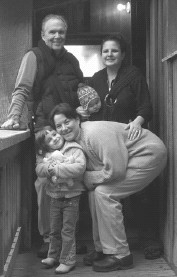By Catherine McTamaney, EdD, society and education lecturer at Vanderbilt University, Nashville, Tennessee USA
 It never occurred to me that anything might go wrong.
It never occurred to me that anything might go wrong.
My partner and I had asked all the big questions as we got ready for the birth of our son. We’d prepared ourselves both physically and spiritually for what we expected to be a smooth, beautiful childbirth assisted by our midwife. It just never occurred to me that we would need anything besides each other to welcome our child into this world.
Okay, okay. I can hear the knowing chuckling of mothers everywhere. Yes, we should have known better. But we didn’t. We were first-timers.
The day before our son was born, a check-up indicated far less movement in utero than our midwife felt was healthy. Because we knew the baby would be large, Deborah recommended a c-section, and we resigned ourselves to surgery.
I didn’t want to sacrifice rooming-in with the baby, however, and the hospital had never tried a rooming-in with a C-section family before. Deborah phoned ahead to let them know of our request. The first nurse we spoke with said she felt it was unwise and that my recovery would be hindered. We asked Deborah to keep calling. She reached the head nurse for the ward, promised that either my partner or another family member would always be with me, and was given the go-ahead for us to room in.
From the moment we were admitted to the hospital, we were the knowing subjects of an unusual experiment. One of our nurses believed strongly in Attachment Parenting and was an enthusiastic supporter. Another believed just as strongly that my body would not heal properly if I were under the additional responsibility of caring for my child. Each of us, naysayers and supporters, waited to prove ourselves right.
On April 22, my son was born, weighing 10 lbs. 15 oz. and healthy as could be, in a delivery room crowded with my midwife, the perionatalogist performing the surgery, a team from intensive care, the delivery nurses, the recovery nurses, the neonatal nurse, and, somewhere in the crowd, my partner and me. Not certain of how to combine a c-section and nonseparation, the hospital had simply sent everyone from their own departments into surgery with us. And so our quiet, natural birth turned into a fabulous, well-attended party, complete with a local Nashville radio station playing in the background. My partner was able to be with our son while my surgery was completed, then brought him to my arms, where he lay comfortably sleeping as my stitches were tied.
From that moment, our son never left us. All the necessary tests were performed in our room. He was bathed, measured, and clothed within my reach. He nursed easily and on demand; I had no engorgement and my milk came in less than 30 hours after surgery. I walked unassisted the morning after his birth. I had little pain or discomfort around my incision, which healed beautifully. I listened to my own body, ate when I was hungry, walked when I needed movement, and never noticed myself healing because I was too busy attending to my child.
Mothering is an obviously generative process, but it is just as importantly regenerative. I had an exceptionally easy recovery from my surgery, and I believe the reason is that it is very difficult to focus on and perpetuate our own pain when we’re admiring our children. I did not have time to think about whether I hurt, because I had a new child to care for. I did not have time to fear mothering, because I had to mother. And the overwhelming joy, the pure and incomparable wonder, the love that makes you smile so hard tears are forced from your eyes, shadowed any discomfort I might have felt. I don’t claim not to have had pain — but I know I didn’t notice it.
On the day we were discharged from the hospital, a day earlier than expected, I was required to attend an orientation meeting. Sitting in a classroom across from the nursery, I watched a young mother pushing a plastic hospital bassinet in which a tiny pink bundle slept. At her side was an older woman, probably her own mother. They stopped at the door to the nursery and pushed it open with the far end of the bassinet. The young mother motioned with one hand to the nurses inside, then she and her mother turned and walked back down the hall.
She never said goodbye to her child, never kissed her or patted her head. She didn’t tuck the blanket in before she left or stop to catch one more glimpse of those tiny fingers. She was already disconnected from the life she’d had within her only a day before. I wondered how different that family might be if, instead of offering drop-in childcare, the hospital had offered instead a supportive environment for attachment. An opportunity was lost, as that family detached, to protect and nurture the bond of mother and child that nature requires of us while we are pregnant, and hospitals so easily regulate out of us once our babies are born.
In retrospect, I believe the reason my partner and I were so blasé about birth classes was because, although we never articulated it, there exists a trust between us that our love for our child would guide us. It is a promise that we have, in turn, given to our son — not that we would make no mistakes, but that we would be guided by love. We didn’t choose Attachment Parenting because we had done long research about its benefits; we chose it because, when we knew our son was coming, we couldn’t bear the thought of not being with him all the time. We didn’t choose to sleep as a family because of scientific research on cosleeping; we chose it because we loved the way our son felt beside us.
How joyous, then, that our instincts, our love for our child, led us to the best practice! We needed the support of our doctors to welcome our child safely into this world, to overcome the practical limits of my own body. But this experience has taught me that, however limited my physical being, my spirit is strong. My spirit heals. My spirit mothers. And when I look down at my happy little scar smiling up at me from across my belly, I know we still had a natural birth. We’ve kept our promise.
 The sign on the door was hardly welcoming. It read, “Warning! Restricted Area. No Trespassing. Use of Deadly Force Authorized!”
The sign on the door was hardly welcoming. It read, “Warning! Restricted Area. No Trespassing. Use of Deadly Force Authorized!” It never occurred to me that anything might go wrong.
It never occurred to me that anything might go wrong. Do you find yourself getting frustrated with your teen? So does every parent at some time. What about anger – has your relationship with your teen turned into a fight for control, and it seems that all your exchanges with your teen seem to be out of anger? For many parents, this is the sad reality of their relationship with their teenager.
Do you find yourself getting frustrated with your teen? So does every parent at some time. What about anger – has your relationship with your teen turned into a fight for control, and it seems that all your exchanges with your teen seem to be out of anger? For many parents, this is the sad reality of their relationship with their teenager. Q: Why doesn’t my partner love me a better?
Q: Why doesn’t my partner love me a better? Nutritional deficiencies in mothers can affect her mental health and lead to inconsistent patterns of mother-child interactions, which in turn increases the likelihood of creating an insecure attachment between the mother and child.
Nutritional deficiencies in mothers can affect her mental health and lead to inconsistent patterns of mother-child interactions, which in turn increases the likelihood of creating an insecure attachment between the mother and child.